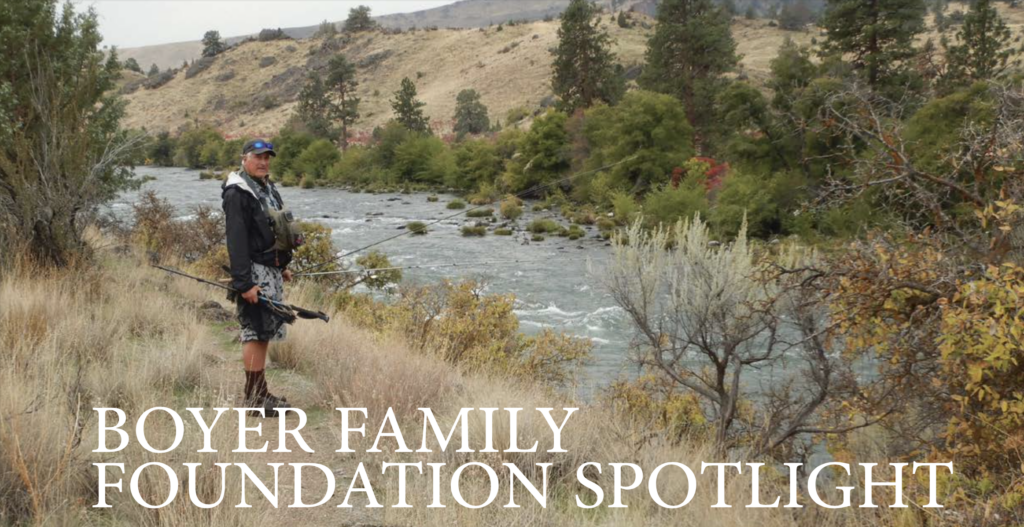July 3, 2024
By Tommy Hough
In the four decades since WaterWatch’s founding in 1985, we’ve developed close relationships with many of our supporters, and WaterWatch has been endlessly fortunate to have forged a lasting relationship with the Bend-based Boyer Family Foundation, helmed by Jeff and Tracy Boyer.
After years of consistent, generous giving by the Boyer Family Foundation, WaterWatch received what can only be described as a transformative gift from Jeff and Tracy in 2023, marking the largest gift WaterWatch has ever received as the foundation begins the move to scale down its giving. With that in mind, we would like to express our thanks to the Boyers and share a bit of their story, commitment to Oregon’s environment, and concern for Oregon’s water future.
Before Jeff and Tracy met as students at the University of Oregon, Jeff was steeped in an appreciation of water and the outdoors growing up on the island of Oahu, where his father served as a professor of environmental studies at the University of Hawaii. Jeff’s father also had a tight connection to the mainland — specifically the northern reaches of California’s Redwoods, where he built a summer cabin along the Smith River in 1953.
Spending summers in this idyllic setting, Jeff began to make his own explorations around the Pacific Northwest, and eventually came to serve as an aide at California’s Jedediah Smith State Park during the summer while earning his undergraduate, and later, urban and regional planning graduate degree at the University of Oregon. Jeff eventually went on to serve with a regional planning agency in Boise, and as the planning director of Crescent City.
Growing up in San Francisco, Tracy credits a life-changing week hiking and camping in Yosemite National Park as her first real outdoor adventure. Immersed in the natural environment of the wild Sierras, losing track of the days as one amazing vista and natural feature was followed by another, the experience centered Tracy’s conservation worldview. Struck by the integral role rivers and water play in healthy ecosystems, Tracy familiarized herself with the rivers of Oregon upon arriving in Eugene to begin college, and after meeting Jeff the two began to travel the state exploring Oregon’s outdoors.
From rafting the Owyhee to skiing Mt. Bachelor to enjoying float trips down the lower Deschutes, Jeff and Tracy developed a commitment not only to each other, but to the preservation and survival of Oregon’s waters and the outdoors. The two especially got to know Central Oregon, and when Jeff’s father established a llama ranch in Sisters following his retirement, they had a family base to further explore and enjoy the region’s outdoors.
“We would drive along the McKenzie River, stop to hike along the Metolius River, and spend days camping and kayaking on the Deschutes,” said Tracy. “How can you not fall in love with Oregon rivers? Each one is so unique, and in my opinion, are some of the most beautiful in the world.”
As a California native, Tracy had experienced water rationing during particularly dry summer months, and saw the devastating impacts of overdevelopment that destroyed habitat and deprived fish and wildlife of the cold, clean water they need to survive. For the couple, ensuring steady flows for rivers and streams was a must for preserving the healthy Oregon environments they treasured. According to Tracy, “It became clear to us how water is the lifeblood of every part of our world.”
Throughout their travels, Jeff and Tracy are often reminded how fortunate they are to make Oregon home, but also see how far our state has to go to be truly environmentally sound. While desert cities like Las Vegas and Mediterranean climates like Marin County have local governments that help homeowners remove lawns in favor of drought-tolerant landscaping, Bend’s turf removal rebate program became so popular that funds allocated for it quickly ran out. While the eagerness among Central Oregon residents to embrace water conservation is good news, Jeff noted Bend and other high desert communities must pursue more robust funding for such programs if they hope to successfully conserve water.
From their years on Oregon’s rivers, Jeff and Tracy have also seen the changes from climate change and derelict dams, from a substantial decrease in fish in the North Umpqua, to increased algae formations in the Deschutes, to coming across hundreds of dead king salmon on visits to the Rogue and Klamath rivers. Even in the free-flowing Smith River, one of the crown jewels of the National Wild and Scenic Rivers System, Jeff and Tracy have noticed decreased flows during summer months lasting well into the fall, and following last summer’s Smith River Complex wildfire, massive volumes of debris and fallen Redwoods clogging the river for weeks. These debris flows have reduced foliage and tree cover along the length of river canyon, potentially affecting the temperature of spawning grounds for salmon and other native fish.
The couple’s international travel has also given them a better perspective on deploying environmental solutions, as Jeff noted his positive impressions of Australia’s national water department and Slovenia’s fisheries system. Jeff was particularly impressed with the lengths Slovenia goes to protect their fisheries, with prospective licensees required to complete courses on various fish license stamps and Eastern European fish habitat.
But even with their travel to Alaska, Canada, Chile, Argentina, and other parts of the word, Jeff and Tracy agree Oregon has the best selection of wild and scenic rivers in the world — especially from their home base in Bend. “Where else can you be on the Metolius in 45 minutes, or the lower Deschutes in 45 minutes, or hike Steens Mountain and fish and camp?” asked Jeff. “We have an amazing concentration of world class rivers and outdoor spaces near us, and we’re committed to protecting them and supporting those who do. That’s why it made sense for us to make our commitment to WaterWatch.”
While Jeff noted he’d like to see more dams that have served their purpose come down so impeded rivers can return to a free-flowing state, he and Tracy agree adapting to the impacts of our warming climate remains the biggest challenge facing Oregonians, our rivers, and our environment. “As we witness the destruction of life and property with the ongoing impacts of climate change,” said Tracy, “it’s clear WaterWatch has its work cut out for it in the decades to come.”
For Jeff, rivers help him “stay sane in an often insane world.” For Tracy, the rivers and water continue to center her environmental worldview. “As much as I love traveling,” she said, “Oregon remains one of the most beautiful, healthy places I know of. That’s why we live here. It’s why we will always fight to protect our forests, rivers, and places of such life-affirming natural beauty.”
This article originally appeared in the summer 2024 issue of WaterWatch of Oregon’s Instream newsletter. Photos courtesy of Jeff and Tracy Boyer and John DeVoe.


